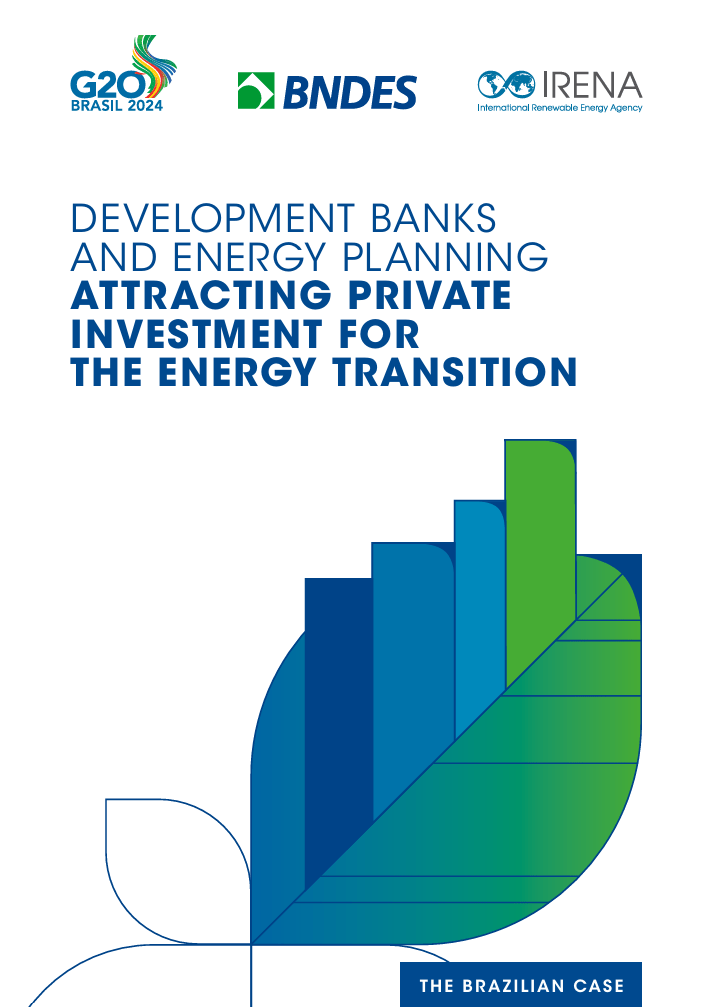Development banks and energy planning: Attracting private investment for the energy transition
 |
The Brazilian case
rapport Oct 2024 ; 72 pages
Aut. Guilherme Arantes & Ricardo Gorini & Emilio Matsumura
Ed. IRENA - Abu Dhabi
Téléchargeable sous format: PdF
Téléchargeable chez l'éditeur
Résumé:
Selon l'IRENA, 150 billions de dollars sont nécessaires pour financer une transition énergétique compatible avec l'objectif des 1,5 °C d’ici 2050. Même si les marchés des capitaux disposent de fonds suffisants pour soutenir de tels investissements, le défi consiste à identifier les instruments et structures financiers qui assureront un financement à long terme et à faible coût pour soutenir tous les investissements nécessaires au taux requis.
Il est particulièrement difficile pour les économies émergentes et en développement d’attirer l’investissement privé en raison des risques perçus ou réels plus élevés, des rendements imprévisibles et de la préférence du secteur privé pour l’investissement dans les marchés matures à faible risque. Le Brésil a toutefois donné un exemple précieux de développement des énergies renouvelables et d’infrastructures en s'appuyant sur les investissements privés.
Ce rapport met l’accent sur l’approche collaborative du pays en matière de financement de la transition énergétique et offre un cadre global pour créer un environnement propice aux projets d’énergie renouvelable. L’exemple brésilien démontre également comment l’expansion des chaînes d’approvisionnement de l’industrie nationale peut favoriser l'emploi et avoir des impacts économiques locaux positifs par le biais de projets liés à la transition énergétique. Abstract:
According to the IRENA, USD 150 trillion is required to finance an energy transition compatible with the 1.5°C pathway by 2050. Even though capital markets have sufficient funds to support such large investments, the challenge lies in identifying financial instruments and structures to ensure low-cost, long-term financing to support all necessary investments at the required rate.
It is particularly challenging for emerging and developing economies to attract private investment due to perceived or real higher risks, unpredictable returns and the private sector’s preference for investing in low-risk mature markets. Brazil has, however, set a valuable example on how to expand renewable energy and infrastructure by scaling up private investments.
This report for the G20 Brazilian presidency, focuses on the country’s collaborative approach to financing the energy transition, offering a comprehensive framework for creating a conducive environment for renewable power projects. The Brazilian example also demonstrates how the expansion of domestic industry supply chains can increase jobs and deliver positive local economic impacts via energy transition-related projects. Contents:
FOREWORD ........................6
KEY MESSAGES ...................8
1. INTRODUCTION ..............9
2. THE GLOBAL CONTEXT OF FINANCING RENEWABLE ENERGY .........16
3. THE BRAZILIAN CASE: A BRIEF DESCRIPTION OF THE INSTITUTIONAL FRAMEWORK OF THE ELECTRICITY SECTOR ............34
4. THE ROLE OF BNDES IN PROMOTING RENEWABLE ENERGY SOURCES .............43
5. LESSONS LEARNED FROM THE BRAZILIAN EXPERIENCE WITH THE DEPLOYMENT OF RENEWABLE POWER .............55
REFERENCES .......................67
Public-Cible:
Mots clefs: |
accès à l'énergie (CI) (DT) (OP) (ope) , développement durable (CI) (DT) (OP) (ope) , financement (CI) (DT) (OP) (ope) |
Pays concerné: |
Editeur/Diffuseur: |
|
IRENA
-
International Renewable Energy Agency - Abu Dhabi - Emirats Arabes Unis |
En cas de lien brisé, nous le mentionner à communication@pseau.org